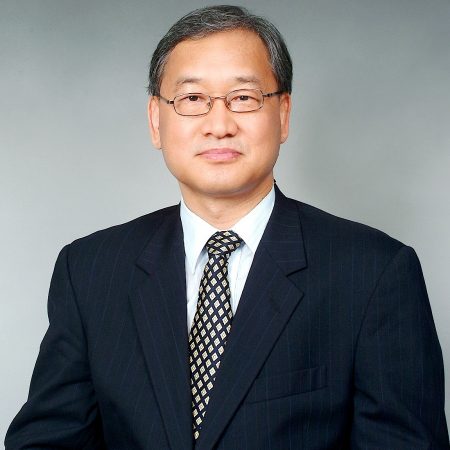
Bong-Soo Lee’s international travels are evident as he thumbs through his worn U.S. passport. Rubber stamps document visits to South Korea, China, Japan, Taiwan and Australia, among other far-flung locales, and hint at the high regard in which he is held at major universities around the globe.
Lee has racked up the miles — 125,000 each year for the past two years — as a much sought-after visiting professor at universities around the world and a lecturer at international conferences, where his discussions combine and apply economic principles with those of traditional finance issues.
With training in economics at Seoul National University (B.A. 1975) and from 1982 to 1986 at the University of Minnesota, where he earned his Ph.D. under the tutelage of four future Nobel Laureates in economics, Lee brings a unique perspective to the study of finance at the Florida State University College of Business, where he is the Patty Hill Smith Eminent Scholar Chair in Finance.
Strongly influenced by these distinguished professors — even before they won major international acclaim — Lee began early in his teaching career to cover advanced topics such as empirical methods in finance, causality, GMM (Generalized Method of Moments), VAR (Vector Autoregression) approach and ARCH (Autoregressive Conditional Heteroscedastic) modeling. He admits he took a risk by covering these non-standard subjects. Lee was certain, however, these men were on the cutting edge and one day would be widely recognized for their work
“I feel I am vindicated to have taught and covered these topics far before they won Nobel Prizes, and I just hoped my students would benefit from these advanced materials, which are not easily available at other business schools, including the top, major business schools,” Lee said.
Lee’s professors, Thomas Sargent and Christopher Sims, shared the 2011 Nobel Prize in economics “for providing ways to understand the impacts of policy changes or shocks, such as surging oil prices on output, inflation or employment,” according to the Nobel Prize website. Leonid Hurwicz shared the Prize in 2007 “for having laid the foundations of mechanism design theory.” And in 2004, Edward C. Prescott shared the honor “for contributions to dynamic macroeconomics: the time consistency of economic policy and the driving forces behind business cycles.”
“It was amazing to have them all at the same time, and I was extremely lucky,” Lee said. He is especially close to Sims, whom he describes as an “exceptional scholar and a humble man,” and for whom Lee’s son, now 31, is named. “We all (fellow Ph.D. candidates) understood that these professors wrote the influential papers in economics.”
Lee is impressive in his own right. He is among the world’s top-ranking finance professors in terms of research production, and his research in financial economics and investment analysis appear in such prestigious journals as the Journal of Finance, Review of Financial Studies, Journal of Econometrics, Journal of Monetary Economics, Review of Economics and Statistics, Journal of Banking and Finance, Financial Management, Journal of Finance and Quantitative Analysis, Real Estate Economics, and the Journal of Business and Real Estate Economics, to name just a few. He has published 72 articles in top refereed journals of international finance and economics. He also serves as a co-editor of the Asia-Pacific Journal of Financial Studies and is an associate editor of Financial Review, Pacific-Basin Finance Journal and Review of Pacific Basin Financial Markets and Policies.
Lee conducted joint research with Sogang University as part of the World Class University program of the South Korean government in summer of 2009 and 2010. He was president of the Korea America Finance Association from 2005 to 2006 and president of the Korea America Economic Association in 2003. He also served as the chair of the advisory board of the Korea America Economic Association in 2010 and 2011. Lee has been a visiting faculty member at a number of schools, including Keio University, Hong Kong Polytech University, Hunan University, Tunghai University (Taiwan), Sogang University (South Korea), National Cheng Kung University (Taiwan), Griffith Business School (Australia) and Postech (South Korea).
Before joining the finance faculty at Florida State in 2005, Lee taught at the University of Houston, where he was the Chase Professor of International Business, and at Iowa State University and the University of Minnesota, where he was an assistant professor. Prior to entering academia, he was a deputy director for Ministry of Government Administration and Ministry of Finance in South Korea from 1974 to 1981.
Shortly after arriving at Florida State, Lee was recruited by the president of the Korea Advanced Institute of Science and Technology (KAIST) to be the founding dean of that institution’s Graduate School of Finance. He spent a successful year there from 2006 to 2007, bringing in millions of dollars in government and private funding that allowed the school to endow a chair, establish a Reuters-KAIST trading room, initiate dual degree programs with London City University (Cass Business School) and the University of Rochester, and recruit top faculty.
Despite his numerous stints as an administrator and faculty member, Lee hasn’t left his first calling.
“I am a permanent, lifelong student, learning finance issues,” he said. “As such, hopefully, I can provide rather unique training to our students with a more diverse approach.”




